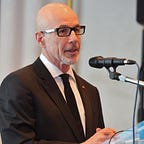Why We Wrote This Book
Hemant Taneja and I have written a new book, with writer Kevin Maney. It’s called UnHealthcare: A Manifesto for Health Assurance. We mean that word, “manifesto.” Before Covid-19, the need for a transformation of our health care system was clear. Now, that transformation is a national imperative.
Years ago, I learned one thing from Steve Jobs. I’ve never forgotten it.
In 2008, I was asked to chair an advisory group for Apple, Inc, to stimulate healthcare ideas for Apple’s iTunesU. Dream job. Led to an Apple-supported conference on digital education in health sciences in 2009.
What I heard convinced me: People were adopting a mobile, digital lifestyle — the future for every industry. This would happen regardless of the device used, but at the time, the iPhone was the flagship for the revolution.
And then we face the big question: What about health care delivery? If every industry is entering the “Fourth Industrial Revolution,” as the World Economic Forum calls it, what does that mean for the future of work in healthcare? What does it mean for the future of our ultimate goal — keeping people health?
Today, America’s healthcare system is a world of contradictions, made even more acute by the Covid-19 pandemic:
- at the bedside, clinicians show unsurpassed inventiveness and caring;
- away from those encounters, the system is confusing, frustrating, expensive and scary;
- invisible to the patient except when she or he wants to see a bill, it’s a system of contradictory payment incentives;
- its power is applied in ways that are deeply inequitable.
It is time — past time — for true relationship-centered healthcare.
It is time — past time — to use technology to integrate and ease how we navigate and offer support for health.
It is time — past time — to ensure that Black Lives Matter in healthcare.
We need a platform to do this work. We call it “health assurance.” This book, UnHealthcare, is your invitation to join us. We know that there are revolutionaries within health systems, we know there are revolutionaries among entrepreneurs. If it is nothing else, this book invites you to become partners. Not vendors! Partners.
Fighting for health assurance gives us the chance to fight for a common goal, the goal all people share: To thrive without healthcare delivery getting in the way. People don’t see themselves as “patients.” They are looking for support, for assurance, for health.
To make this happen, we need technology. We especially need technology that can reach beyond the rich. This cannot be a way to make the wealthy healthier.
We need policy, even as we know we cannot depend on the government to make this transformation happen. That is why in this book we call for broadband access to the internet to be seen as a utility. The United States succeeded in bringing electricity and clean water to almost every home — because they were conceived as “utilities.” Connectivity must be seen as a utility.
We need machine intelligence. The enormous quantities of data that will support health assurance is beyond the instant recall of a single physician. By using artificial intelligence on a digital platform, we can make precision medicine into the ultimate tool for population health — we can create the dashboards of risk and planning that help people with complex needs. That is why in this book we call for a commitment to ethical and responsible innovation.
We need empathy. The era of selecting medical students based on their memorization skills must end. Machines will do that better. As Alibaba founder Jack Ma said at the World Economic Forum, “when we invented cars, we didn’t try to teach our kids to run faster than a car. When we invented airplanes, we didn’t try to teach our kids to fly.” We need clinicians who build relationships, with creativity, communication, and empathy. We need students selected for leadership skills and emotional intelligence.
We need healthcare with no address. The historic growth of hospitals in the late 1800s and all through the 1900s created the wrong mindset. Yes, we need hospitals for the very ill, for complex therapies, for emergencies. But the digital, mobile future is health at home, at school, wherever you are. Even with Covid-19, the majority of those who contracted the virus were cared for at home. That’s why technology helps.
And lastly, as we detail throughout this book, we must respond to what Covid-19, the economic crash, and protests over racial injustice made clear. People should be “mad as hell and not going to take it anymore.”
Every positive disruption in our society has caused some pain to the traditional system. Incremental tweaking will not transform our broken, fragmented, expensive and inequitable system.
It will take creative and unlikely partnerships to have healthcare come out of the Covid-19 crisis to a new age of digital, mobile consumerism.
I invite you to join us in creating that age.
